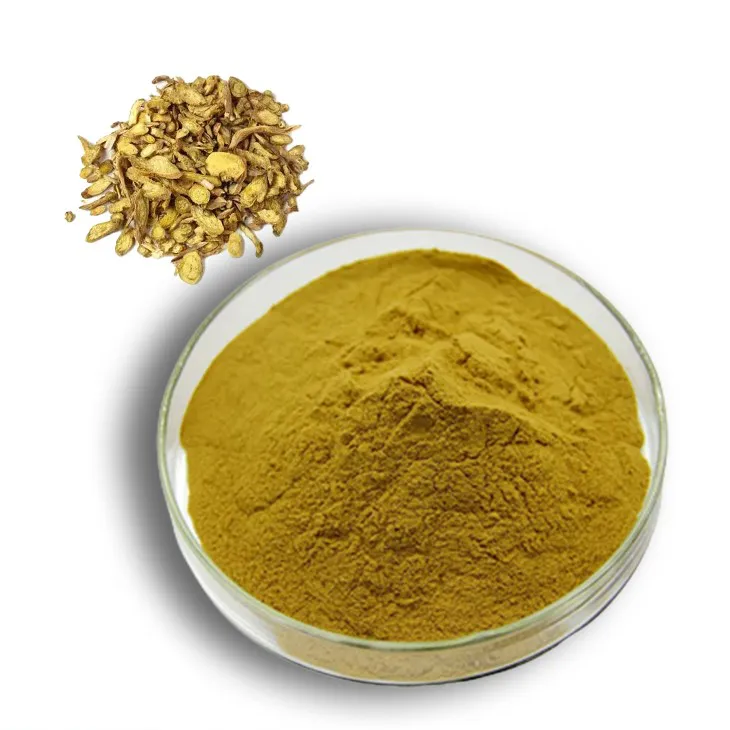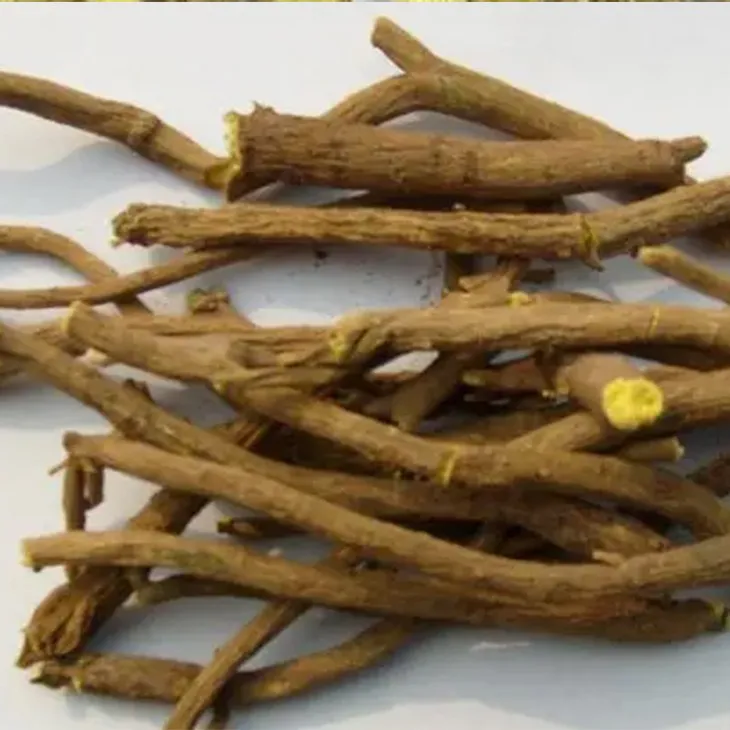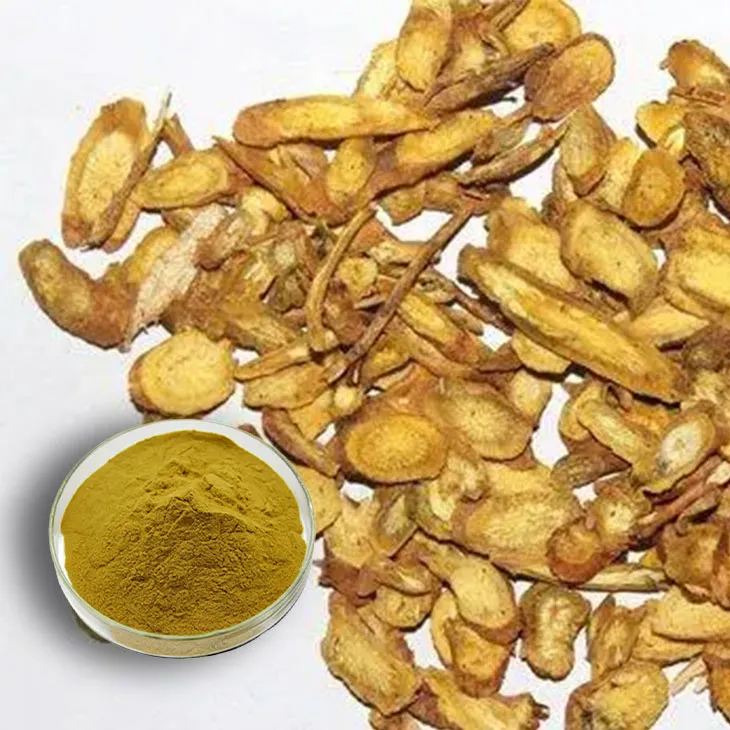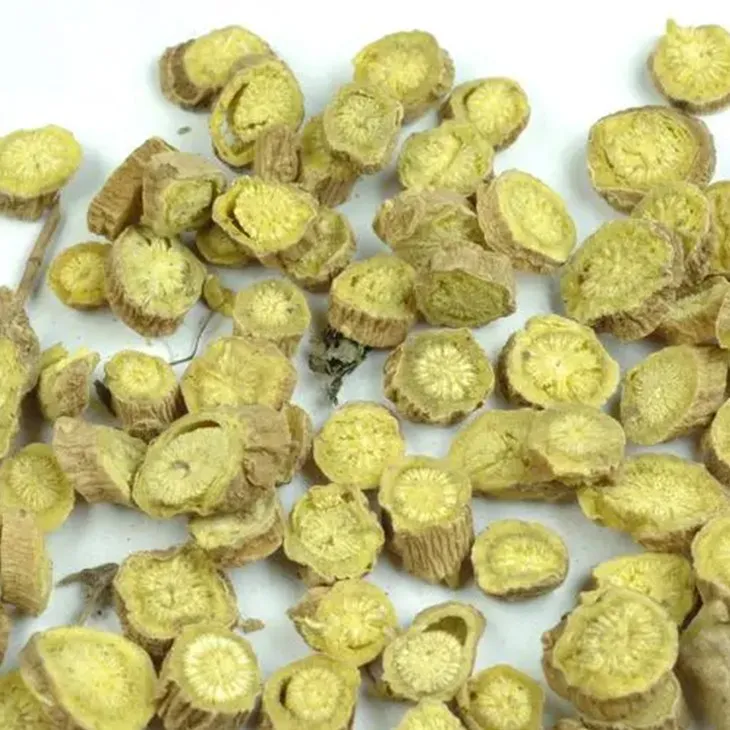- 0086-571-85302990
- sales@greenskybio.com
Extraction of baicalin by steam distillation.
2024-11-29

1. Introduction
Baicalin is a flavonoid glycoside with a wide range of biological activities, such as anti - inflammatory, antioxidant, and antibacterial properties. It is found in plants, particularly in the roots of Scutellaria baicalensis. Extracting Baicalin efficiently is crucial for its applications in the pharmaceutical, cosmetic, and food industries. Steam distillation is one of the methods that can be employed for this purpose.

2. The Principle of Steam Distillation
Steam distillation is based on the principle that when steam is passed through a mixture containing the compound of interest (in this case, Baicalin), the volatile components associated with the compound vaporize. Volatility is a key concept here. Different substances have different volatilities, which depend on their molecular structures and intermolecular forces.
For baicalin extraction, the plant material serves as a source of baicalin. When steam is introduced, the heat and the presence of water vapor cause the substances in the plant material to become more mobile. The volatile components that are either part of the baicalin molecule or associated with it in the plant matrix start to turn into vapor. This vapor can then be collected and further processed to obtain the baicalin.

3. The Process of Steam Distillation for Baicalin Extraction
3.1 Preparation of Plant Material
The first step in steam distillation for baicalin extraction is the proper preparation of the plant material. The roots of Scutellaria baicalensis are typically harvested. They need to be cleaned thoroughly to remove any dirt, debris, or other contaminants. After cleaning, the roots are usually dried to a certain extent. This drying process helps in reducing the water content, which can affect the efficiency of the steam distillation process. However, it is important not to over - dry the roots as this may lead to the degradation of baicalin or other components.
3.2 The Steam Distillation Setup
A typical steam distillation setup consists of a steam generator, a distillation flask containing the plant material, a condenser, and a collection vessel.
- The steam generator produces steam, which is then passed into the distillation flask containing the prepared plant material.
- As the steam passes through the plant material in the flask, the volatile components associated with baicalin start to vaporize. The non - volatile components remain in the flask.
- The vapor then travels through the condenser. The condenser cools the vapor, causing it to condense back into a liquid. This liquid, which contains the volatile components along with baicalin, is collected in the collection vessel.
3.3 Post - Distillation Processing
Once the steam distillation is complete, the collected liquid needs further processing. This liquid may contain other substances in addition to baicalin. Purification steps are required to isolate baicalin.
- One common method is solvent extraction. A suitable solvent can be used to extract baicalin from the collected liquid. The choice of solvent depends on the solubility properties of baicalin and other components in the liquid. For example, ethyl acetate is often a good solvent for flavonoids.
- After solvent extraction, further purification techniques such as chromatography may be employed. Chromatography can separate baicalin from other closely related compounds based on their different affinities for the stationary and mobile phases.

4. Advantages of Steam Distillation for Baicalin Extraction
4.1 High Purity of the Extracted Product
Steam distillation can result in a relatively high - purity product. Since the process is based on the volatility of components, it can effectively separate baicalin from many non - volatile impurities present in the plant material. The subsequent purification steps further enhance the purity of the final baicalin product. This high - purity baicalin is more suitable for applications in the pharmaceutical industry, where purity is of utmost importance.
4.2 Environmentally Friendly
Compared to some chemical extraction methods, steam distillation is relatively environmentally friendly. It mainly uses steam, which is a natural and non - toxic substance. There is no need for the use of harsh chemicals that may have negative environmental impacts. Also, the waste generated during the steam distillation process is generally less harmful compared to chemical extraction waste. For example, in some chemical extraction methods, large amounts of organic solvents are used, which may be difficult to dispose of properly and can cause pollution.

5. Applications in the Pharmaceutical and Natural Product Industries
In the pharmaceutical industry, baicalin extracted by steam distillation can be used in the development of drugs for various diseases. Its anti - inflammatory properties make it a potential candidate for the treatment of inflammatory disorders such as arthritis. Drug formulation studies can be carried out using the high - purity baicalin obtained through steam distillation.
In the natural product industry, baicalin can be used in the production of dietary supplements and cosmetics. For dietary supplements, baicalin can be added to products claiming antioxidant or immune - boosting properties. In cosmetics, it can be used in creams and lotions for its antioxidant and skin - protecting effects.
6. Challenges and Future Directions
6.1 Challenges
One of the challenges in steam distillation for baicalin extraction is the optimization of the process parameters. The efficiency of the extraction can be affected by factors such as the temperature of the steam, the flow rate of the steam, and the amount of plant material used. Finding the optimal combination of these parameters to maximize the yield of baicalin while maintaining its quality is not always straightforward.
Another challenge is the cost - effectiveness of the process. Although steam distillation is relatively simple in principle, the equipment required and the energy consumption can make the overall cost of extraction relatively high. Reducing the cost without sacrificing the quality of the extracted baicalin is an area that needs further research.
6.2 Future Directions
Future research could focus on improving the steam distillation process for baicalin extraction. This could involve the development of more efficient steam distillation equipment. For example, new designs of condensers that can improve the condensation efficiency and reduce energy consumption.
Another future direction could be the integration of steam distillation with other extraction and purification techniques. For instance, combining steam distillation with supercritical fluid extraction in a multi - step process could potentially improve the overall extraction efficiency and purity of baicalin.
7. Conclusion
Steam distillation is a promising method for baicalin extraction. It is based on the principle of volatility and involves a series of steps from plant material preparation to post - distillation processing. The method has several advantages, including high - purity product extraction and environmental friendliness. Despite some challenges, there are many future directions for research and development to further improve the steam distillation process for baicalin extraction and expand its applications in the pharmaceutical and natural product industries.
FAQ:
1. What is the principle behind steam distillation for baicalin extraction?
The principle is based on the different volatilities of substances. Steam is passed through the plant material containing baicalin, and the volatile components associated with baicalin vaporize.
2. What are the advantages of using steam distillation for baicalin extraction?
One advantage is that it can produce a relatively high - purity extracted product. Also, compared to some chemical extraction methods, it is more environmentally friendly.
3. How is the plant material prepared before steam distillation for baicalin extraction?
The specific preparation steps may vary. Generally, it may involve cleaning, drying, and possibly grinding the plant material to an appropriate size to ensure efficient extraction during the steam distillation process.
4. Can steam distillation be used for large - scale extraction of baicalin?
Yes, it has the potential for large - scale extraction. However, factors such as equipment capacity, cost - effectiveness, and quality control need to be carefully considered and optimized for large - scale operations.
5. Are there any limitations to steam distillation for baicalin extraction?
One limitation could be that it may not be as efficient as some other extraction methods for certain types of plant materials or in cases where the baicalin is tightly bound within the plant matrix. Also, the process may require more time and energy compared to some alternative extraction techniques.
Related literature
- Optimization of Steam Distillation for Baicalin Extraction"
- "Steam Distillation in Natural Product Extraction: Focus on Baicalin"
- "The Role of Steam Distillation in Baicalin - Rich Extract Production"
- ▶ Hesperidin
- ▶ Citrus Bioflavonoids
- ▶ Plant Extract
- ▶ lycopene
- ▶ Diosmin
- ▶ Grape seed extract
- ▶ Sea buckthorn Juice Powder
- ▶ Fruit Juice Powder
- ▶ Hops Extract
- ▶ Artichoke Extract
- ▶ Mushroom extract
- ▶ Astaxanthin
- ▶ Green Tea Extract
- ▶ Curcumin
- ▶ Horse Chestnut Extract
- ▶ Other Product
- ▶ Boswellia Serrata Extract
- ▶ Resveratrol
- ▶ Marigold Extract
- ▶ Grape Leaf Extract
- ▶ New Product
- ▶ Aminolevulinic acid
- ▶ Cranberry Extract
- ▶ Red Yeast Rice
- ▶ Red Wine Extract
-
Giant Knotweed Extract
2024-11-29
-
Tormentil Extract
2024-11-29
-
Curcuma Longa Extract
2024-11-29
-
Oat Straw Extract Powder
2024-11-29
-
Moringa powder
2024-11-29
-
Black Pepper Extract
2024-11-29
-
Berberis aristata Extract
2024-11-29
-
Baicalin
2024-11-29
-
Andrographis Paniculata Extract Powder
2024-11-29
-
Motherwort Extract
2024-11-29




















